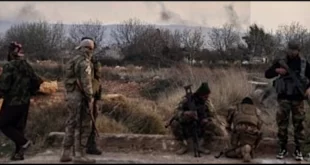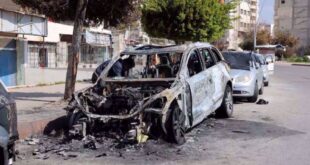October 29, 2017 – Moon of Alabame
A UN commission concluded that the Syrian government is responsible for a widely discussed incident in Khan Sheikhoun. An alleged gas attack by air happened in April in an al-Qaeda controlled area in Syria. It was used by the White House to justify its bombing of a Syrian airbase.
The now released report was made to fit the narrative. The details below show that it was not the result of a serious investigation. This explains why Russia blocked the extension of the mandate of the reporting commission.
On October 26 Reuters reported: Syrian government to blame for April sarin attack: U.N. report
UNITED NATIONS (Reuters) – The Syrian government of Bashar al-Assad is to blame for a chemical attack on the opposition-held town of Khan Sheikhoun that killed dozens of people last April, according to a report sent to the United Nations Security Council on Thursday.“The Syrian Arab Republic is responsible for the release of sarin at Khan Sheikhoun on 4 April 2017,” the report from the U.N. and the Organization for the Prohibition of Chemical Weapons’ Joint Investigative Mechanism (JIM) said.
The official report has not been published. But someone obtained a copy of the Seventh report of the Organisation for the Prohibition of Chemical Weapons-United Nations Joint Investigative Mechanism (pdf) and we make it herewith available.
The reports notes “irregularities” that makes one wonder how its writers could ever have come to this conclusion:
Based on the foregoing, the Leadership Panel is confident that the Syrian Arab Republic is responsible for the release of sarin at Khan Shaykhun on 4 April 2017. The findings of the Leadership Panel regarding the evidence in this case are based on the information set forth in detail in annex II.
Note the verbal choices the commission made: “.. is confident ..” is not a wording that conveys surety and “..is responsible for the release” does not mean that the Syrian Arab Republic in fact did it.
The reports conclusions are NOT by the Organisation for the Prohibition of Chemical Weapons or even endorsed by it. They were made by the “Joint Investigative Mechanism” which consists of a Guatemalan diplomat, an UN bureaucrat from Malaysia educated in the U.S. and a chemical expert who works for the Swiss government. It is a political board with a political judgement.
The reasons for that rather vague wording, which is not reflected in the news reports, can be found in the details. The report says on page 10:
The Mechanism determined that sarin was released from the location of a crater in the northern part of Khan Shaykhun between 0630 and 0700 hours on 4 April 2017.
Many of the reports findings are based on open source videos and photographs published by the opposition. It acquired witnesses statements from the area which is under control of al-Qaeda. It also examined forensic evidence for which no chain of custody existed. Some findings are strange.
In annex II, on page 36 (of 39) of the pdf, it notes:
Certain irregularities were observed in elements of information analysed. For example, several hospitals appeared to start admitting casualties of the attack between 0640 and 0645 hours. The Mechanism received the medical records of 247 patients from Khan Shaykhun who were admitted to various health-care facilities, including those of survivors and a number of victims who died from exposure to chemical agent. The admission times of the records range between 0600 and 1600 hours. Analysis of the aforementioned medical records revealed that in 57 cases, patients were admitted in five hospitals before the incident in Khan Shaykhun (at 0600, 0620 and 0640 hours). In 10 such cases, patients appear to have been admitted to a hospital 125 km away from Khan Shaykhun at 0700 hours while another 42 patients appear to have been admitted to a hospital 30 km away at 0700 hours. The Mechanism did not investigate these discrepancies and cannot determine whether they are linked to any possible staging scenario, or to poor record-keeping in chaotic conditions.
At least 23% of the alleged casualties of the incident WERE ADMITTED TO HOSPITALS BEFORE THE INCIDENT HAPPENED.
The hospital 125 km away, a two hour drive, must have been a regular one in Turkey. It is highly unlikely that such a well organized hospital would mix up the arrival time. It is impossible that the casualties admitted at 0700 hours were those of an incident in Khan Sheikhoun that happened, according to the commission, at 0630. The commission did not investigate the discrepancies and it asserts that it does not determine if the incident was staged or not.
Another curiosity:
An inconsistency was identified in one of the Fact-Finding Mission biomedical results from samples without a chain of custody. In sample number 133, the blood tested negative for sarin or a sarin-like substance, while the urine sample tested positive for the sarin degradation product isopropyl methylphosphonate. There is currently no explanation regarding the inconsistency.
The commission also notes a point that we had detailed back in April:
The Mechanism observed from open sources that treatment of victims from Khan Shaykhun frequently involved oxygen and cortisone therapy. This treatment is not recommended for sarin intoxication, but is mainly for lung damage, as would be caused by either chlorine or vacuum bombs.
The report misses the early reporting we had documented shortly after the incident happened:
First reports on that day by the Turkish government news agency Anadolu mentioned only chlorine … The first OPCW statement on April 4 referred to chlorine, not sarin or similar … The first report of the Turkish government also said chlorine
Moreover, according to local press reports the first 30 casualties that arrived at the Turkish border were diagnosed as chlorine affected, not as Sarin casualties. Neither did the patients in any of the videos show strong Sarin symptoms nor did the emergency personal take the necessary precautions for handling a Sarin incident.
The incident was most likely not caused by an air attack at 0630 that distributed Sarin. It was probably caused by a local Chlorine release that must have happened at an earlier point in time. The Sarin and air attack story was only later attached to it. The incident was adopted as a show the White House used to justify its bombing attack on Syria and to thereby divert from its domestic problems. It released an amateurish “intelligence assessment” on the incident that was not prepared by any intelligence agency but by the White House itself.
All evidence the investigation says it obtained from Khan Sheikhun, biomedical, environmental, physical sample as well as media, were obtained without a chain of custody. It was taken by Al-Qaeda or by groups Al-Qaeda allows to work in areas it controls. The terrorist and the opposition to the Syrian government, and certainly their sponsors, had an obvious interest in manipulating evidence of the incident to then blame it on the Syrian government.
The former prime minister of Qatar just admitted on TV that Qatar, in tight cooperation with Saudi Arabia, Turkey and under direction of the United States delivered weapons and money to the “opposition” in Syria, including to al-Qaeda, since the very beginning of the conflict:
Al-Thani even likened the covert operation to “hunting prey” – the prey being President Assad and his supporters – “prey” which he admits got away (as Assad is still in power; he used a Gulf Arabic dialect word, “al-sayda”, which implies hunting animals or prey for sport). Though Thani denied credible allegations of support for ISIS, the former prime minister’s words implied direct Gulf and US support for al-Qaeda in Syria (al-Nusra Front) from the earliest years of the war, and even said Qatar has “full documents” and records proving that the war was planned to effect regime change.
These same forces, especially the U.S., are still determined to “regime change” Syria. To this purpose the U.S. military is preparing for a long-term occupation of the areas its Kurdish proxies in north-east Syria now control.
 Syria Support Movement solidarity with the Syrian people
Syria Support Movement solidarity with the Syrian people




